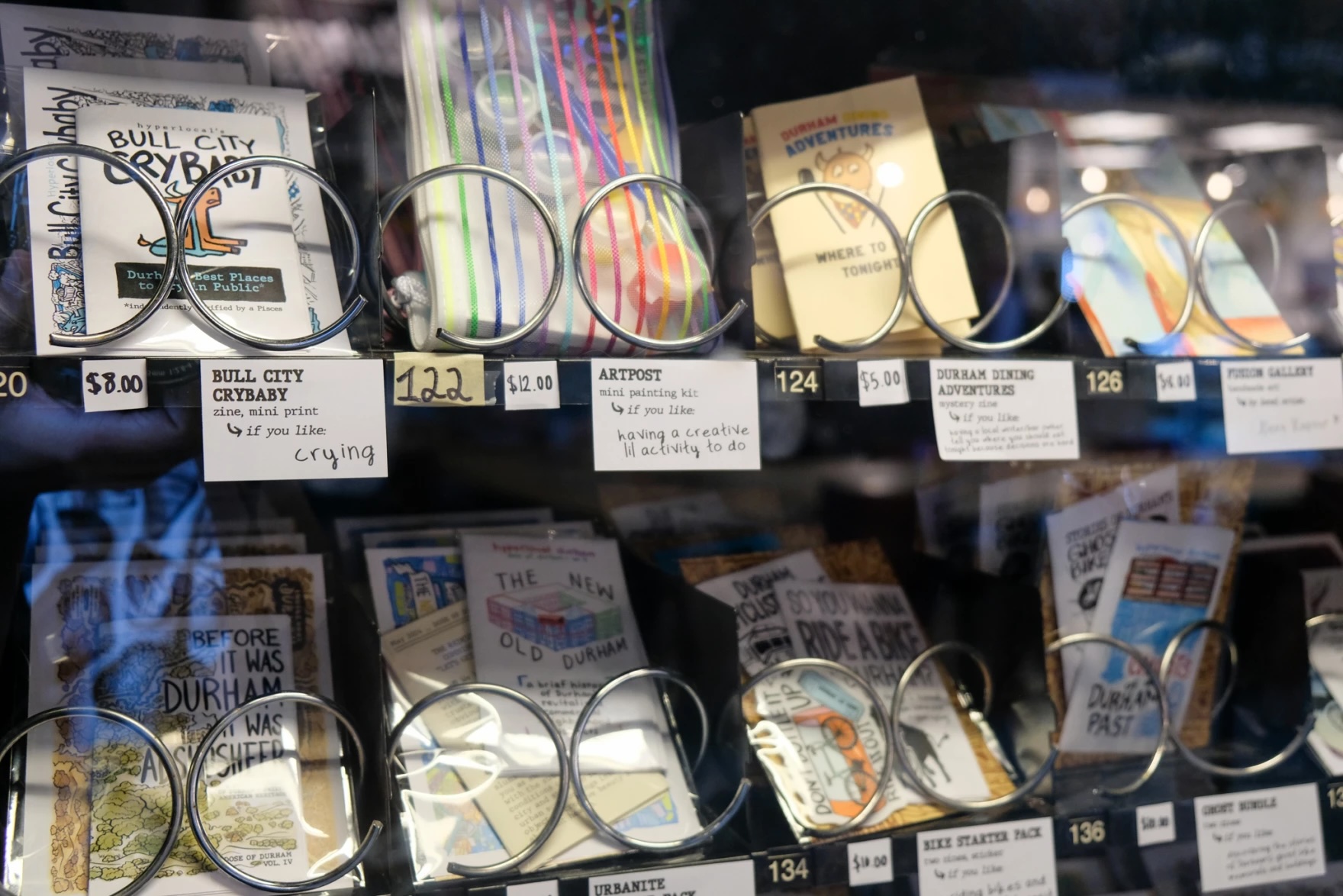WUNC – At Durham Food Hall, a new vending machine has become the subject of much intrigue – instead of chips and candies, it offers to feed patrons in a different way: by sharing knowledge about the city of Durham through zines.
The Hyperlocal Durham vending machine, installed in late October, sells a variety of shortform works that are mostly made by artist and bike advocate Kelsey Graywill. Zines, which have surged in popularity in recent years, are often self-published pieces of literature that can display the maker's artwork and also convey useful information.
The vending machine offers zines that span a variety of topics. They include maps of local ice cream and coffee shops, urban foraging spots, places important to the area's Indigenous history, queer historical landmarks, and even locations around town to have a good cry.
Graywill, 29, moved to Durham from Colorado in 2014 to study at Duke University, where she studied neuroscience and human creativity. She left to get a master's degree in the same field of study in London, then decided to return to Durham.
"After I moved back here, I felt totally unmoored," Graywill said. "Finding a sense of community in Durham was really important to me and the way I did that was basically riding my bike around with my friends, learning about different shops that were opening or noticing different fruits falling from the trees during different seasons."
"As I started to collect this body of knowledge about things I was discovering in Durham, that helped me find the kind of spaces and people I wanted to be around," she added. "I was compiling them into these little bite-sized zines to help other people do the same thing."
Graywill started making zines roughly three years ago, after running a zine workshop at Duke. At the time, she was already an illustrator making comics, and after teaching the workshop, she started a subscription service in which she would make a new zine about exploring some aspect of Durham each month. That project, originally called "Dose of Durham," eventually grew into the Hyperlocal Durham project.
"(Zines) have been used by people who were on the margins of society to share poetry, to share art, to share news about things happening in their community," Graywill said. "For me, that was a great outlet to talk about random stuff in Durham, whether that was my favorite ice cream shops or how urban renewal and the freeway impacted communities here. It has been truly everything spanning the fun and whimsical, to stuff that is kind of hard and heavy to learn about."
Zines can be made in many different kinds of ways, but Graywill usually uses the eight-page format, which involves taking a single sheet of paper and folding and cutting it into a small, eight-page book. She said she likes the challenge of trying to boil a topic into the span of a few small pages.
"I think it's also what makes people resonate with (zines) so much – they want to be able to learn about the city and connect to it without reading a whole history textbook or watch a two-hour YouTube video essay to learn about where they live," Graywill said. "I purposefully chose a medium I felt like people would enjoy holding in their hands."
This past summer, Graywill launched a Kickstarter campaign to raise at least $2,400 to purchase a vending machine that had been sitting unused in her co-working space. She ended up raising just over $3,300, which covered the machine and some initial operating costs.
" I've had a lot of people that in the area that make these, that are like, 'Oh, now that this is here, I kind of wanna make a zine about like my favorite donuts in Durham, or maybe like the history of my specific industry in Durham,'" she said. "And I would love for people to do that. The goal with (Hyperlocal Durham) was, if you create the infrastructure for the thing that you want to see, people will come."
Folks interested in distributing their zines at the Hyperlocal Durham vending machine can fill out an interest form.

